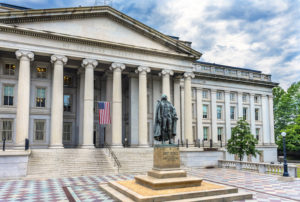
President Trump announces steel and aluminum tariffs, Federal Reserve seeks comments on rollback of Volcker Rule, and more…
IN THE NEWS
- The Trump Administration announced it would place steel and aluminum tariffs on Canada, Mexico, and the European Union “after repeatedly delaying tariffs to allow more time for discussions.” The import duties are 25 percent on steel and 10 percent on aluminum, as first imposed in March on countries that were not granted a temporary exemption.
- The Board of Governors of the Federal Reserve voted unanimously to seek comment on its proposal to roll back the “Volcker Rule,” a rule banning banks from either engaging in proprietary trading or operating or owning private equity or hedge funds. The Volcker Rule requirements, part of the Dodd-Frank Wall Street Reform and Consumer Protection Act, would be relaxed in proportion to the size of a financial institution’s trading activities under the proposed rollback. Federal Reserve Board Vice Chairman for Supervision Randal Quarles praised this proposal, saying that “by clarifying and simplifying the compliance regime, we can promote safety and soundness while reducing unnecessary burdens.”
- In an 8-1 decision, the U.S. Supreme Court limited the scope of police searches, requiring officers to have a warrant to search a vehicle parked at a home or on the surrounding property. Writing for the majority, Justice Sonia Sotomayor stated that warrantless searches in this situation would “render hollow the core Fourth Amendment protection the Constitution extends to the house” and noted that ruling otherwise would disadvantage those who could not afford garages. Justice Samuel Alito, the sole dissenter, found the search “entirely reasonable,” as there was probable cause, and the search would have been permitted had the vehicle been parked on the street outside the house.
- The City Attorney of San Francisco, Dennis J. Herrera, subpoenaed ride-hailing companies Uber and Lyft to find out whether their internal documents classify drivers as employees or independent contractors. California requires companies to prove affirmatively that their workers are “independent contractors” before they can deny their workers wages and benefits guaranteed to employees. The subpoenas are part of Herrera’s investigation into whether Uber and Lyft are violating San Francisco city ordinances that guarantee wages and benefits. “We are not going to turn a blind eye if companies in San Francisco deny workers their pay and benefits,” Herrera said.
- The Internet Association, a trade group representing leading global Internet companies such as Google and Amazon, submitted a filing requesting flexibility in disclosing funding sources for political advertisements. The filing comes in response to a Federal Election Commission proposal to regulate online political ad disclosures. The Association noted that placing a notice of an ad’s origins is difficult, considering the many forms advertising takes online, and instead the Association proposed placing a link to this information that would be “visible and accessible in all formats.”
- After a student shot and killed nine classmates and a teacher at a Santa Fe, Texas high school, Texas Governor Greg Abbott released a gun safety plan he called a “starting point” for protecting students in schools. The proposed recommendations include arming more school officials and “hardening” schools with metal detectors, deadbolt locks, and greater control of entrances and exits. Prior to the release of the plan, Lieutenant Governor Dan Patrick had been criticized for blaming the shooting on “too many entrances and too many exits” in schools.
- The U.S. Food and Drug Administration (FDA) approved the first stand-alone prosthetic iris—the colored part of the eye that surrounds the pupil—intended to treat patients with missing or damaged irises. Malvina Eydelman of FDA’s Center for Devices and Radiological Health said the device “reduces sensitivity to bright light and glare” and “improves the cosmetic appearance of the eye” in patients with iris defects.
- The Virginia Senate approved an expansion of Medicaid for low-income adults, providing coverage for an additional 400,000 residents. State Senator Ben Chafin (R), one of four Republicans to vote in favor of the expansion, reportedly stated that “doing nothing about the medical conditions, the state of health care in my district, just wasn’t the answer any longer.” State Senate Majority Leader Thomas K. Norment Jr. (R) criticized the vote, reportedly stating that it “abandons Virginia’s long-standing reputation for fiscal responsibility.”
- The U.S. Securities and Exchange Commission (SEC) obtained an emergency court order freezing the assets of Titanium Blockchain Infrastructure Services Inc. to halt “ongoing fraud” related to Titanium’s initial cryptocurrency coin offering. The SEC’s complaint alleged that Titanium’s website contained fabricated testimonials and that its president fraudulently claimed to have business relationships with numerous corporate clients.
WHAT WE’RE READING THIS WEEK
- As more states move to legalize cannabis for recreational use, Mark A.R. Kleiman of the Marron Institute of Urban Management at New York University and Jonathan Iwry of Harvard Law School argued in a recent paper that a user-set quota system may offer a regulatory approach that both respects personal autonomy and encourages cannabis users to limit their consumption. This type of system could “help users set responsible targets for consumption, and offer an enforcement mechanism that prevents harm to others at minimal cost to offenders.” The system may also be applicable to other “temptation goods” like gambling, according to Kleiman and Iwry.
- In a paper for the George Washington University Regulatory Studies Center, Zhoudan Xie and Daniel R. Pérez, policy analysts at the Center presented a taxonomy of regulatory forms. Xie and Pérez expected that their three-tier taxonomy could be used in a wide range of fields to provide a framework for analyzing different regulations.
- Is blockchain, the technology that makes Bitcoin possible, relevant to antitrust enforcement? Yes and no, wrote Ai Deng, lecturer with the Advanced Academic Programs at Johns Hopkins University and principal at Bates White Economic Consulting, in a draft paper. Blockchain-powered “smart contracts”—code-scripted contracts that execute themselves when their conditions are met—are no different from paper contracts as far as regulators are concerned because both leave paper trails. In other words, competitors’ potential use of smart contracts to enforce cartel agreements is just as suspicious as forms of explicit agreements. Tacit collusion, however, may become easier for competitors using blockchain technology. Concluding that cartels may use smart contracts despite their drawbacks, Deng advised antitrust agencies to develop expertise in smart contract design and programming languages.



